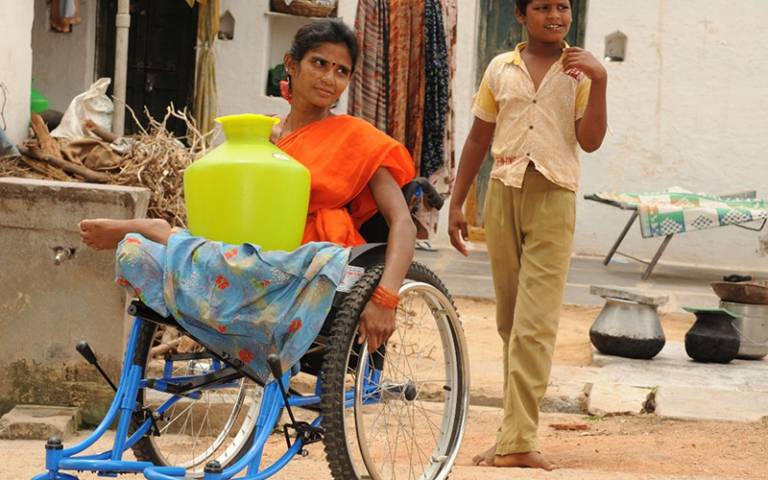UK-India collaboration to develop wheelchair-accessible maps of Delhi
20 February 2019
Researchers with the Global Disability Innovation Hub, co-led by UCL, are developing wheelchair-accessible maps of Delhi with colleagues in India, using innovative sensing platforms.

The collaborative project with the Indian Institute of Technology Delhi (IIT-Delhi), called Street Rehab, has been designed to gain a clear understanding of user needs, available technology and the accessibility of the city.
“Infrastructure in India can often make pushing a wheelchair or tricycle difficult. We’re trying to identify how people are currently getting around in Delhi, to find new ways of facilitating rehabilitation and identifying ways to improve infrastructure,” said Dr Catherine Holloway (UCL Interaction Centre), the Academic Director of the Global Disability Innovation Hub (GDI Hub).
The UCL team has developed low-cost sensors that can identify features of the sidewalk and gauge how the wheelchair or tricycle users propel themselves. The sensors are linked to the user’s mobile phone, to make their mobility device part of the Internet of Things, and to enable users to access the sensor data via an app. They can also add geo-tagged photo or voice notes to annotate their journey.
For the first stage of the Street Rehab project, the researchers teamed up with local NGOs to find wheelchair and tricycle users from across the socio-economic spectrum, who were the study participants and also advised on the development of the project.
Anonymous data from the participants’ sensors has helped create a map of accessibility in parts of Delhi.
The research team, led by Dr Holloway alongside partners in the UK and India, is now continuing the project to develop a larger dataset of the wheelchair accessibility of Delhi, to then identify what needs to be improved and to deliver a service to wheelchair users to aid in their rehabilitation.
“Development of assistive technologies for empowerment of people with disabilities is extremely important. To achieve social and economic inclusion through research and innovation, UCL and IIT-Delhi will have joint activities in design, development and dissemination of assistive technology which sits between economic burden and economic prosperity,” said Professor P. V. Madhusudhan Rao (IIT-Delhi).
The GDI Hub seeks to accelerate disability innovation across the globe through co-design, collaboration and innovation, bringing together the world's best academics, disability experts and designers to improve the lives of the world's one billion disabled people.
It was launched by Mayor of London Sadiq Khan in September 2016, stemming from the legacy of the London 2012 Paralympic Games, led by founding partners UCL, Queen Elizabeth Olympic Park, Loughborough University London, University of the Arts London, Victoria & Albert Museum, Sadler’s Wells, Helen Hamlyn Centre for Design, and Leonard Cheshire.
One of the core activities of the GDI Hub is a £10 million project called AT2030, funded by the UK’s Department for International Development (DFID), that aims to bring life-changing assistive technology, such as wheelchairs and eyeglasses, to all.
The GDI Hub’s AT2030 project is expanding into Nairobi, Kenya, this year, and the team is in discussions with colleagues in Delhi to explore opportunities for an innovation hub in India.
AT2030 seeks to reach at least 3 million people, develop new technologies and service delivery models, spark dozens of start-ups and opportunities for investment and innovation to help people living with disabilities.
Links
- UCL Interaction Centre
- UCL Computer Science
- UCL Engineering
- Dr Catherine Holloway's academic profile
- Global Disability Innovation Hub
- Indian Institute of Technology Delhi
- UK's Department for International Development (DFID)
Image
Credit: WHO/GATE
Media contact
Chris Lane
tel: +44 20 7679 9041
E: chris.lane [at] ucl.ac.uk
 Close
Close

